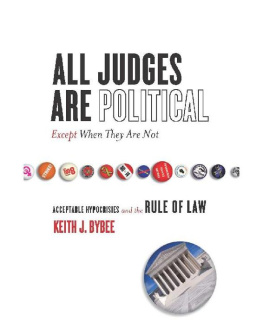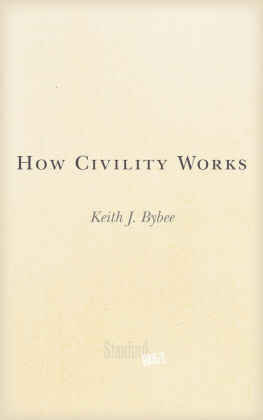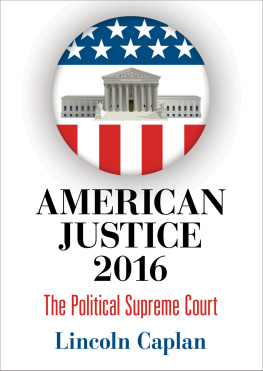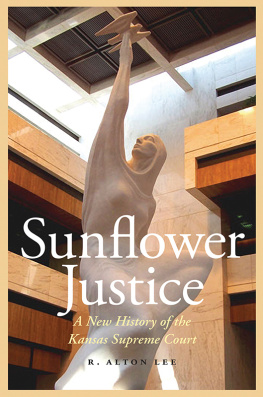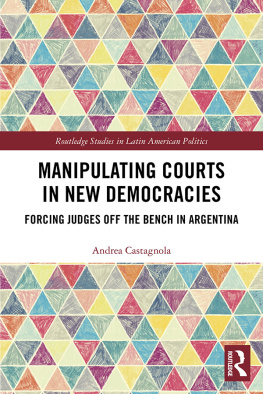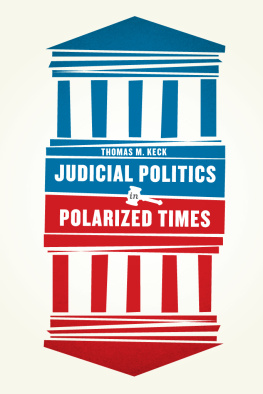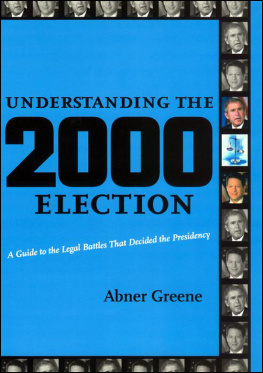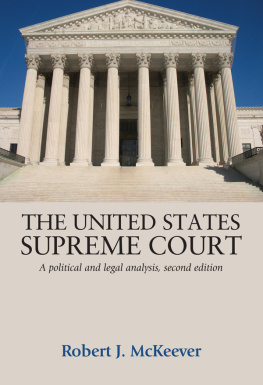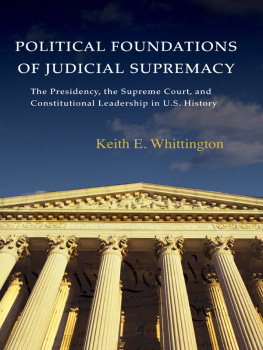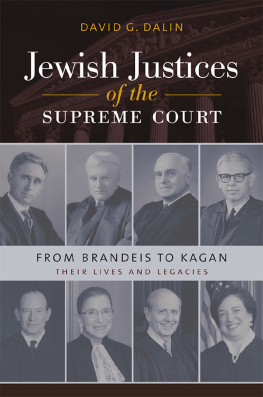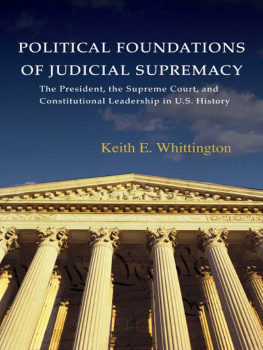THE CULTURAL LIVES OF LAW
Edited by Austin Sarat
All Judges Are PoliticalExcept When They Are Not
Acceptable Hypocrisies and the Rule of Law
Keith Bybee
Stanford University Press
Stanford, California
2010 by the Board of Trustees of the Leland Stanford Junior University. All rights reserved.
No part of this book may be reproduced or transmitted in any form or by any means, electronic or mechanical, including photocopying and recording, or in any information storage or retrieval system without the prior written permission of Stanford University Press.
Printed in the United States of America on acid-free, archival-quality paper
Library of Congress Cataloging-in-Publication Data
Bybee, Keith J., 1965
All judges are politicalexcept when they are not : acceptable hypocrisies and the rule of law / Keith J. Bybee.
p. cm.
Includes bibliographical references and index.
9780804775618
1. Judicial processUnited States. 2. Political questions and judicial powerUnited States. 3. Rule of lawUnited States. I. Title.
KF8775.B93 2010
347.7312dc22
2010011546
Typeset by Classic Typography in 11/13.5 Adobe Garamond
For Jennifer, Evan, and Ava
Table of Contents
Part I
Legal Realism: Dead and Alive
IN THE WINTER OF 2003, THE NEW YORK TIMES announced the triumph of legal realism, the theory that suggests judicial decisionmaking is essentially a matter of politics. Spargos political enthusiasm earned him a judicial promotion. In 2001, he was elected to the State Supreme Court in Albany County.
Spargos politicking was less popular in other quarters. The New York State Commission on Judicial Conduct charged Spargo with violating the state rules governing judicial behavior. In response, Spargo filed suit claiming that the state code of judicial conduct was unconstitutional. The federal district court agreed. Applying the United States Supreme Court decision Republican Party of Minnesota v. White , the court ruled that Spargo was free to be as politically active as he had been.
Interestingly enough, Spargo himself was among the first to call legal realisms victory into question. Although he thought that the ruling was absolutely good because it freed judges to be more involved in the political life of their communities, he otherwise believed that the decision pushed a political understanding of the courts too far. When people think of Tom Spargo, Spargo said, many would consider my reputation as a kind of partisan hack lawyer or Republican law expert. But when you get on the bench, then all that is behind you.... [F]rankly, I have not had a political thought in any of the work that Ive done as a judge. It was one thing to acknowledge that politics played a part in judicial life, but it was altogether something else to argue that judicial decisionmaking was all politics. When it came to legal realism, Spargo seemed to suggest, it was best to accept a little bit, but not too much.
Spargos ambivalent reaction to his own exoneration seemed hard to believe. How could he consistently lay claim to the roles of both politician and judge? He had assiduously courted voters through frankly political electioneering. On the basis of his behavior, one could easily infer that Spargo was a judge who could be counted on to represent the interests of his political supporters. Yet, if this were true, then Spargo had misled litigants and the general public by claiming to be unbiased. By trying to have it both ways, simultaneously playing partisan politics and claiming judicial impartiality, Spargo risked looking like a hypocrite: his courtroom behavior appeared to be an act, an effort to affect a degree of neutrality and open-mindedness which he did not possess. He claimed to give litigants a serious hearing, but his behavior suggested that he was just giving them the pretense of being heard .
In principle, Spargo easily could have avoided landing in such a bind. He could have stuck to a single role and thus eliminated the appearance of hypocrisy. For example, he could have responded to his courtroom victory by insisting that judicial decisionmaking is a thoroughly political enterprise. The goal, Spargo might have claimed, is not to pretend that judges operate on the basis of neutral legal principles but to recognize that judges are political actors with power over controversial policy questions. As a result, Spargo could have argued that open judicial politicking is a welcome sight. Vigorous judicial elections contested by aggressively political candidates allow voters to select and control the officials responsible for making legal policy. Reasoning along such lines, Spargo might have sincerely defended his actions as a critical contribution to democratic politics.
Alternatively, Spargo could have denounced the claims of legal realism from the outset. He could have argued that although elected politicians are necessarily obligated to represent the voters who placed them in office, judges are only required to represent the Law. The job of the judge, Spargo might have claimed, is to reason strictly on the basis of legal principle, to assimilate each dispute before the court into a coherent legal order, and to articulate a framework of rules capable of regulating subsequent judicial decisions. Spargo could have run a low-key, nonpartisan campaign and muted his political participation once on the bench. Indeed, he could have argued against the whole idea of judicial elections and insisted that a judges loyalty to the law rightly renders him indifferent to popularity. Had Spargo sincerely cultivated a reputation for independence and impartiality, he would have eliminated the risk of being seen as a partisan hack lawyer. He would have had no reason to contest charges leveled by the Commission on Judicial Conduct, since he would have never engaged in any judicially untoward actions in the first place.
And yet Spargo did not adopt either of these alternative strategies. Instead of choosing between the roles of active politician and impartial judge, he clung to both and defended his behavior by arguing that judges are political actorsexcept when they are not.
The legal realism that Spargo at once embraced and renounced has a venerable lineage. In 1897, Oliver Wendell Holmes, then a member of the Supreme Judicial Court of Massachusetts, warned his Boston University School of Law audience against supposing that the only force at work in the development of the law is logic. This mode of thinking is entirely natural, Holmes admitted. The training of lawyers is the training in logic. The processes of analogy, discrimination, and deduction are those in which they are most at home. The language of judicial decision is mainly the language of logic. And logical method and form flatter that longing for certainty and repose which is in every mind. The natural mode of thinking about the law clearly feels right, but Holmes argued that it is in fact wrong. Certainty, Holmes famously said, is illusion and repose is not the destiny of man. Behind the logical form lies a judgment as to the relative worth of and importance of competing legislative grounds, often an inarticulate and unconscious judgment, it is true, and yet the very root and nerve of the whole proceeding. Lawyers and judges may talk of sound logic, impersonal principle, and impartial judgment, but the law is actually driven by politics.
In the decades following Holmess address, a loose group of scholars that came to be known as legal realists took up Holmess remarks and fashioned them into a way of thinking about the judicial process. The realists devoted themselves to exposing the role played by politics in judicial decisionmaking and, in doing so, they called into question conventional efforts to anchor judicial power on a fixed legal foundation. The realist rejection of objective judicial reasoning proved to be quite popular and has been widely adopted. Less than one hundred years after Holmes spoke, a prominent legal historian noted that the claim we are all realists now had been made so often in legal scholarship that it was a kind of truism.
Next page
